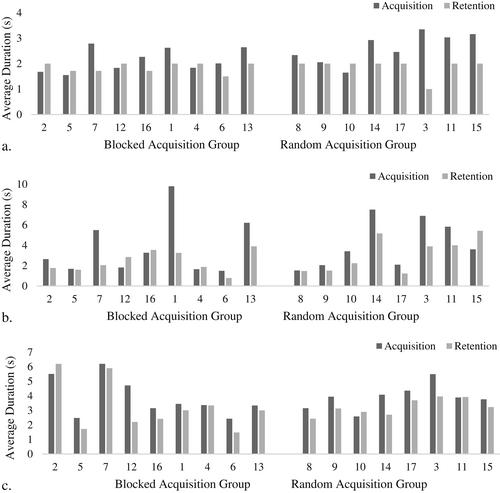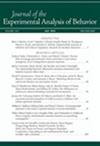上下文干扰对家养狗训练后的技巧保留的影响的初步研究。
IF 1.4
3区 心理学
Q4 BEHAVIORAL SCIENCES
引用次数: 0
摘要
这项研究试图通过确定人类运动技能学习研究的一项发现,即上下文干扰(CI)效应,是否可以在伴侣狗的技巧训练范式中复制,来加强当前的狗训练实践。在人类身上,研究表明,与封锁顺序相比,以随机顺序练习技能可以提高对这些技能的学习。为了在狗身上测试这个问题,我们随机分配了17只狗进行封闭训练(低CI)或随机训练(高CI)。这些狗进行了三种不同难度的行为。训练后,我们进行了一项保留测试,每组中有一半的狗按封锁顺序执行任务,另一半按随机顺序执行任务。我们对每一个技巧进行评分,测量持续时间,并测量狗是否需要一次或两次尝试来完成一种行为。我们发现,在训练和保留测试中,随机或按封锁顺序练习三个技巧的狗之间没有显著差异。本研究首次将CI效应应用于犬技训练。尽管没有发现CI效应的证据,但目前的研究为未来的研究提供了一个初步框架,可能会对提高培训技能的保留率产生影响。本文章由计算机程序翻译,如有差异,请以英文原文为准。

A preliminary examination of the contextual interference effect on trained trick retention in domestic dogs
This study sought to enhance current dog training practices by determining whether a finding from human motor skill learning research, the contextual interference (CI) effect, could be replicated in a trick-training paradigm with companion dogs. In humans, research shows that practicing skills in random order, as compared with blocked order, improves learning of those skills. To test this question in dogs, we randomly allocated 17 dogs to blocked training (low CI) or random training (high CI). The dogs performed three behaviors of varying difficulty. After training, we conducted a retention test in which half of the dogs in each group performed the tasks in blocked order and the other half in random order. We scored each trick, measured duration, and measured whether dogs required one or two tries to perform a behavior. We found no significant differences between dogs who practiced three tricks in random or in blocked order during training and during a retention test. This study is the first to apply the CI effect to dog trick training. Although no evidence of the CI effect was found, the current research provides a preliminary framework for future studies with potential implications for increasing retention of trained skills.
求助全文
通过发布文献求助,成功后即可免费获取论文全文。
去求助
来源期刊
CiteScore
3.90
自引率
14.80%
发文量
83
审稿时长
>12 weeks
期刊介绍:
Journal of the Experimental Analysis of Behavior is primarily for the original publication of experiments relevant to the behavior of individual organisms.

 求助内容:
求助内容: 应助结果提醒方式:
应助结果提醒方式:


